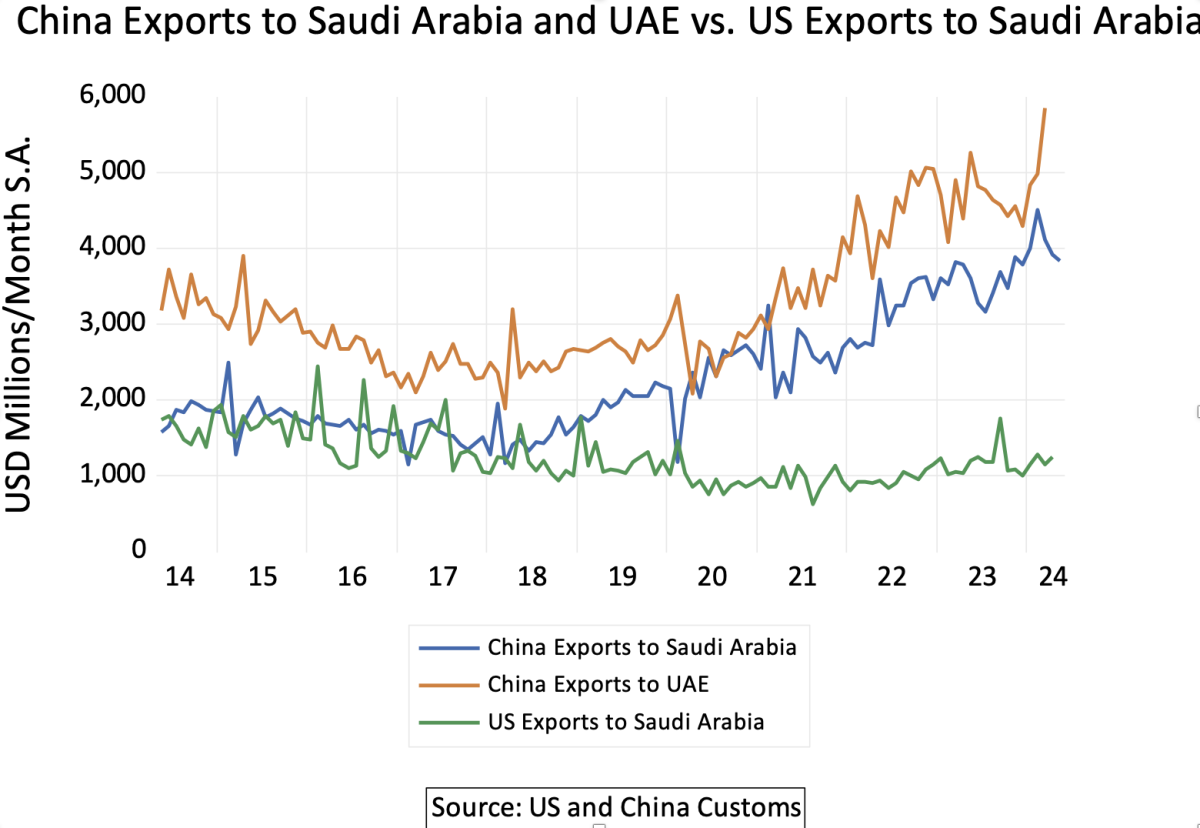In 2013, I warned that Pax Sinica might supplant America’s dominant role in the Middle East. As the largest importer of Persian Gulf oil, China wants regional stability. To that end, China’s first foray into Middle East diplomacy came in December 2022, when it issued a joint statement with Sunni Gulf states condemning Iran’s destructive role in the region. But when Beijing brokered the restoration of diplomatic relations between Iran and Saudi Arabia in March 2023, China proved it had arrived as a regional power.
China’s industrial might is driving its growing influence in the Middle East: exports to Saudi Arabia have quadrupled since 2018, and exports to the region, including North Africa, have doubled, while U.S. exports to the Persian Gulf states have stagnated.

China is providing the Gulf with AI-controlled solar power, cloud computing, 5G broadband and transportation infrastructure. Saudi Arabia and the United Arab Emirates are probably Huawei’s largest overseas markets for 5G infrastructure, despite dire US warnings against doing business with Chinese national leaders. The company, on the other hand, doesn’t sell telecom infrastructure; it stopped making it a generation ago.
That is why all roads in the Muslim world lead to Beijing. Turkish Foreign Minister Hakan Fidan visited Beijing last week, “the latest effort by Ankara to position itself at the center of the strategic trade route between Europe and China,” VOA reported. Turkey, which once championed Uighur rights against China’s alleged “genocide,” is now rounding up Uighur dissidents in Turkey and deporting them to China. In the last week of May, four Arab leaders, including Egyptian President Fatah al-Sisi, attended the China-Arab Forum in Beijing.
The $2 trillion Belt and Road Initiative aims to integrate China with West Asia and ultimately Europe through a new transportation network crisscrossing Eurasia with Chinese-built railways and pipelines. After the Biden administration withdraws from Afghanistan in 2022, China is picking up the rubble in Central Asia, providing infrastructure and financial support to the fragile economies of the former Soviet Union. Meanwhile, China and Russia have resolved most of their differences over dominance in Central Asia and are acting as partners.

Jade Gao – Pool/Getty Images
China has 200 troops stationed in the Middle East and its only overseas base is in Djibouti, and its military budget is focused on defending its massive coastal missiles, satellites, aircraft and submarines rather than forward deployments.
Sino-Israeli relations have been friendly but frosty given China’s historical pro-Palestinian stance. But it has long been possible to defend Israel in China’s mainstream media, as I did in December 2022. After the Hamas massacre of October 7 last year, Chinese policy turned decisively anti-Israel. Chinese commentators and netizens have taken a stance against the Jewish state like iron filings on a piece of paper with a magnet stuck underneath.
Why? Israel is an ally of the US, and the US and China are locked in a hostile contest. Israel is a target. China has no special affection for Arabs or Persians, nor any special enmity towards Jews. China is on the offensive relentlessly against Washington.
To make matters worse, the war in Ukraine has forced Russia and China into a de facto alliance against the United States. The Americans play Monopoly, the Russians play chess, and they are playing Iran. Fianchetto In the Ukrainian context, as I warned in 2008, “If Washington chooses to demonize Russia, it will likely become a saboteur with respect to U.S. strategic interests overall and use the Iran issue to manipulate the United States.”
President Vladimir Putin warned on June 5 that Russia may provide weapons to the West’s enemies to counter attacks on the country with Western weapons. Putin is probably referring to the Houthis, many of whose officers have trained in Russian military schools and have already fired missiles at Israel. Washington seriously underestimated the effectiveness of sanctions against Russia and Russia’s staying power. Here again, Israel is the target. Russia, like China, is a competitor, not a customer, of Saudi Arabia and stands to benefit from a disruption in oil supplies.
To make matters worse, the US has blocked Israel’s military response to Hamas, withholding ammunition supplies to the Israel Defense Forces. The Pentagon has rejected Israel’s plan to flood Hamas tunnels with seawater as an alternative to reduce collateral damage to Gaza civilians. As Erik Prince revealed: Asia Times.
A Trump victory in November would restore American support for Israel and, if Trump follows through on his promise to end the Ukraine war, reduce the threat from the Iranian flank. That would be the best outcome.
But China’s advantages in broadband, transportation and energy infrastructure can meet Eurasia’s development needs, so its influence in the region will likely grow no matter what the United States does.
Either way, Israel will have no choice but to engage with China. It is worth remembering Ben Gurion’s all too often quoted injunction to “Fight the White Papers as if there were no wars, and fight the wars as if there were no White Papers.” This will have to be Israel’s approach from now on.
David P. Goldman is deputy editor of Asia Times, a Washington Fellow at the Claremont Institute and a member of the advisory board of Sino-Israel.org, a think tank focused on Sino-Israel dialogue. The opinions expressed in this article are Goldman’s own.
The views expressed in this article are the author’s own.
Rare knowledge
Newsweek is committed to challenging conventional wisdom, seeking common ground and finding connections.
Newsweek is committed to challenging conventional wisdom, seeking common ground and finding connections.

